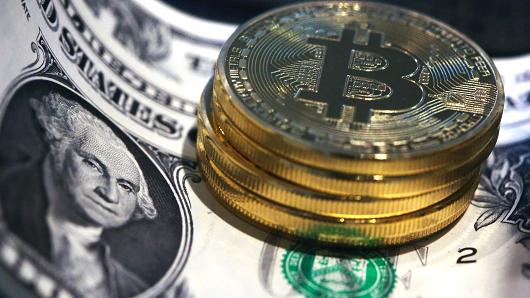Bitcoin wobbles as traders turn to other cryptocurrencies

It's been a volatile period for Bitcoin investors, as holders of the cryptocurrency prepare for a potential 'fork' in the blockchain.
From Friday morning until Monday afternoon, Bitcoin was trading under the $1,000 level, and even fell beneath $900 on Saturday. This is significant as, barring the weekend of March 18 and 19, Bitcoin has traded above $1,000 since early February and hit a fresh all-time high of around $1,325 on March 10.
Bitcoin is currently back above the $1,000 handle, but is well off these recent highs, wiping billions off of its market cap value.
There are several causes for the recent volatility: Chinese regulators cracked down on Bitcoin exchanges, while U.S. authorities rejected a proposal for a Bitcoin-backed exchange-traded fund (ETF). The current concern is over the future of the Bitcoin technology.
Bitcoin faces a scaling issue, where the number of Bitcoin transactions that can happen on the blockchain at any one time is limited. This is creating a backlog of transactions that are needed to be processed and slowing down the system.
A group called Bitcoin Unlimited advocates for increasing the size of the blocks on the blockchain in order to process more transactions, but this has split the community. To increase the block size would involve splitting the blockchain, causing a fork and creating two major blockchains. This would effectively create two different coins and it's not clear which would become dominant.
As a result, investors are hedging their bets or selling out of Bitcoin, waiting to see whether or not the fork will happen, and if so, which blockchain will be favored by the market.
Data from Bitfinex indicates around 49 million more coins have been sold than bought, or roughly 5 percent of total coins traded, in the last 30 days. Through March, the number of long Bitcoin positions held by investors has decreased from 26,858 to above 23,142, while the number of short positions has increased from 9,820 to 14,731.
Meanwhile, the market cap of blockchain assets other than Bitcoin, such as ether, dash and monero, has more than doubled since March 10 from $3.5 billion to more than $7 billion, according to Chris Burniske, blockchain products lead analyst at ARK Invest.
"At the same time, Bitcoin's market cap has gone from $19 billion to $16 billion. Hence, Bitcoin's market cap has lost $3 billion in value while the combined market cap of all other blockchain assets has added more than $3 billion," he told CNBC via email.
"Given these market indicators, it would appear investors are diversifying their blockchain asset holdings, positioning themselves for a generally rising tide in this emerging asset class."
Whether or not the fork happens is hard to tell, but it may harm Bitcoin's brand, according to Jani Valjavec, co-founder of ICONOMI, a digital asset management platform for cryptocurrencies. Valjavec argues the brand is the main thing behind Bitcoin's value.
"It has wide acceptance now, real world use cases, it can be a great store of value, and it is currently trusted by the community. Our understanding is that a hard fork, instigated by two parties with very competing interests, will primarily weaken the brand," he told CNBC via email.
"The next biggest brand in the distributed economy is Ethereum, and that's why we believe it will benefit the most."
However, Fran Strajnar, co-founder & CEO of data and research company Brave New Coin, says the market is still within the parameters of a Bitcoin bull cycle.
"The proposed contentious fork is unlikely but better to happen now than in the distant future. We would end up with the original Bitcoin and remaining miners activating segwit (a well-designed package of system upgrades) and a new, much smaller, privatized alternative version of Bitcoin," he told CNBC via email.
"The sum result of all the network fork (fear, uncertainty and doubt) is we are seeing investors hedge by buying into ether. We expect a price drop if there is a fork but a similar outcome to Ethereum, where the long term market capitalization increases for both assets."
David – http://markethive.com/david-ogden